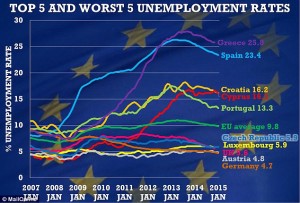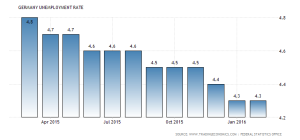German Unemployment statistics sugggest that Germany is doing much better than its EU partners. Unemployment rates are falling despite the growing numbers of migrants settling in Germany.
Comparing German unemployment data with the data of other European states reinforces this impression.

Source: http://www.dailymail.co.uk/news/article-2975883/Jobs-surge-means-Britain-lowest-unemployment-rate-Europe-5-6-work.html
Digging into the statistics can reveal a different picture. German unemployment rates are understating the true unemployment rate by understating the numbers who are unemployed through the use of what the Germans refer to as, ‘mini jobs’. These jobs are low paid, usually part time jobs where employers evade social insurance contributions and workers do not tax or social insurance.
Belgium protests over German low pay in EU complaint
Peters (2013) writing in an article for the BBC highlighted the hidden problem of low pay in Germany. Not all jobs in Germany are well paid. A significant proportion of the german workforce are trapped in low paid employment. Many struggle to survive with one job and are forced to take on second jobs to make ends meet. Peters (op.cit.) highlights an investigation initiated by the European Commission following a complaint from Belgium, ‘about low wages at some German firms, described by Belgium as unfair “social dumping“.
The Belgian government alleges that Germany’s “mini-jobs” undermined EU competition rules. Peters reports that some workers get just three or four euros (£3) hourly in such jobs, without any social protection, Belgium says. The Commission says some 7.5 million people are working under the “mini-job” regime in Germany. This group working in “mini-jobs” are distorting Germany’s employment statistics. Under the mini jobs scheme, workers can earn up to 450 euros per month without paying tax or contributing to any pension system. They are also excluded from the employer’s social security contributions. This system is allowing German firms to employ workers without paying the true cost of employing workers. It is a distortion of the labour market and is considered to be anti-competitive.
The Belgians are angered by the employment system in Germany. In Belgium, low-paid workers get a minimum of 12-13 euros per hour and all have to make social security contributions (op.cit).
The Belgian complaint was raised following complaints from Belgian abattoirs, who claim German low-wage competitors were threatening their survival. Some Belgian firms have even suggested that they may have to move to Germany. Support for the Belgian position comes from a surprising quarter. Olaf Lies, economy minister in the German state of Lower Saxony, has voiced support for the Belgian complaint. Only Germany and Malta have no statutory minimum wage in the 27-nation EU.
Around 30 per cent of workers in Germany earn less than 8.5 euros per hour. This wage rate is below the OECD poverty level (op.cit.) Concerns have been raised in Wales and the rest of the UK about companies importing cheap labour from other EU countries.
In 2012, the European Commission urged Germany to create the conditions for wages to grow in line with productivity. Extensive use of mini-jobs is believed to lead to low acquisition of pension rights. There is a need to improve the transition from mini-jobs to more stable forms of contracts.
Ferguson (2012) in an article entitled, ‘All Work and Low Pay: Getting By Without Minimum Wage in Germany’ reported that while Germany’s economy may be the strongest in Europe, its working poor have failed to feel the positive effects of that prosperity. The lack of a minimum wage has been cited as one reason for their suffering.
Ferguson interviewed a middle-aged woman selling sausages at a kiosk on Berlin’s central Alexander Platz square. The woman commented that, ‘After rent and bills there’s barely anything left at the end of the month.”
The German Institute for Economic Research (DIW), one in five Germans earn less than two-thirds of the median hourly working wage of €9.62. Almost two out of every three low paid workers is a woman. The state guarantees a “minimum standard of living” for its citizens. This means that means the government — rather than employers — ensures that people get enough money to survive. This policy is credited by as being one reason for Germany’s low unemployment rate. Critics argue that the policy is simply condoning bad employment practices and fuelling growing social inequality.
In Germany, around one million workers qualify for state support because their earnings are considered too small to survive on. A “sizeable proportion” of those who receive government income supplements are actually working full time. In some cases, welfare payment structures mean that low-wage workers could actually make more money if they chose not to work and received unemployment benefits instead. This is an example of the poverty trap which the UK government has sought to eliminate.
Source:
Ferguson K. (2012) All Work and Low Pay: Getting By Without Minimum Wage in Germany’ Der Spiegel Online International http://www.spiegel.de/international/germany/low-paid-workers-struggle-despite-germany-s-booming-economy-a-832724.html (as viewed 20/03/2016)
Peters L. (2013) ‘Belgium protests over German low pay in EU complaint’ BBC News http://www.bbc.co.uk/news/world-europe-22080862 (as viewed 20/03/2016)

